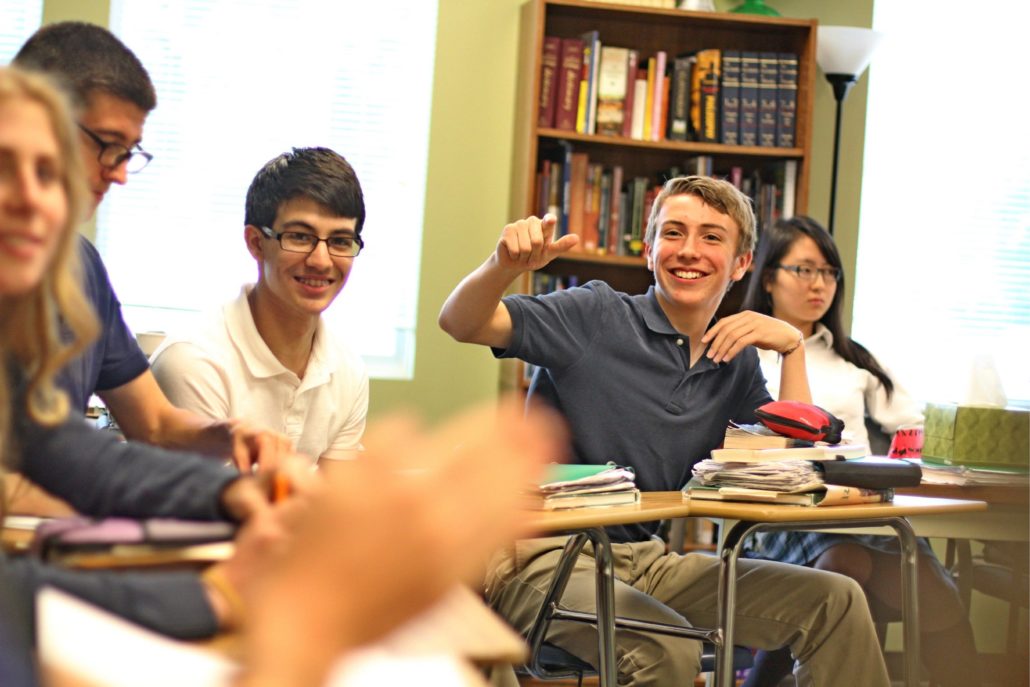How to raise children who can sit with a good book and read? Who are moved by beauty? Who delight in innocence? Who can walk outdoors and enjoy the beauty of weeds and sparrows? Who still possess youth, which lends them both a frolic childlikeness and a wisdom beyond their years? Who have no compulsions – who don’t have to attend to the constant buzzing of a smartphone, or click on the next link and the next link and the next link, or buy the latest gadget, or submit to the instant urge? – Anthony Esolen, Life Under Compulsion
Toward Freedom and Joy
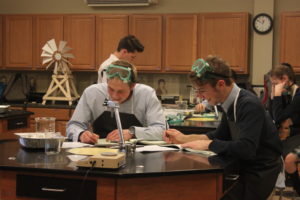 A liberal arts education is a journey toward freedom and maturity, preparing students to live lives of courage, character, and conviction. On this path they learn self-discipline, faithfulness, and perseverance through the rigors of a classical education. On this path also comes joy and camaraderie as students explore their world and discover how God’s truth embraces every aspect of their lives. At Covenant, students are treated as image bearers of God, endowed with creativity, reason, and love. They are not simply crammed with information to parrot back on a test, but instead receive time-tested tools of logic and reason which equip them to become excellent thinkers and learners. We believe that receiving a liberal arts education under the Lordship of Christ can help students to grow strong in their faith, so that they “may no longer be children, tossed to and fro by the waves and carried about by every wind of doctrine, by human cunning, by craftiness in deceitful schemes.” (Ephesians 4:14).
A liberal arts education is a journey toward freedom and maturity, preparing students to live lives of courage, character, and conviction. On this path they learn self-discipline, faithfulness, and perseverance through the rigors of a classical education. On this path also comes joy and camaraderie as students explore their world and discover how God’s truth embraces every aspect of their lives. At Covenant, students are treated as image bearers of God, endowed with creativity, reason, and love. They are not simply crammed with information to parrot back on a test, but instead receive time-tested tools of logic and reason which equip them to become excellent thinkers and learners. We believe that receiving a liberal arts education under the Lordship of Christ can help students to grow strong in their faith, so that they “may no longer be children, tossed to and fro by the waves and carried about by every wind of doctrine, by human cunning, by craftiness in deceitful schemes.” (Ephesians 4:14).
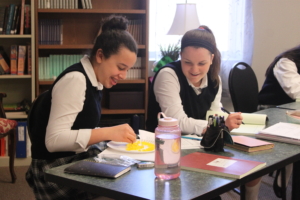 Our Upper School includes both dialectic and rhetoric training. While we call 7th through 9th grades the dialectic school and the 10th through 12th grades the rhetoric school, instruction in both disciplines is spread throughout the Upper School across the boundaries.
Our Upper School includes both dialectic and rhetoric training. While we call 7th through 9th grades the dialectic school and the 10th through 12th grades the rhetoric school, instruction in both disciplines is spread throughout the Upper School across the boundaries.
Dialectic School
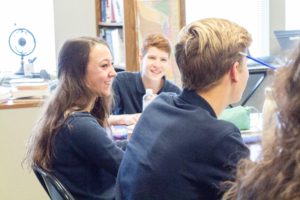 During the dialectic school years the teaching methods shift from the songs and chants of Grammar School to discussion, debate, and argument. Students continue to make use of the “tools” that they acquired in Grammar School, but the emphasis becomes the new dialectic tools. Students are not merely passive recipients, but are actively engaged in their learning through Socratic questioning and a good bit of give and take (dialectic) with their peers and teachers.
During the dialectic school years the teaching methods shift from the songs and chants of Grammar School to discussion, debate, and argument. Students continue to make use of the “tools” that they acquired in Grammar School, but the emphasis becomes the new dialectic tools. Students are not merely passive recipients, but are actively engaged in their learning through Socratic questioning and a good bit of give and take (dialectic) with their peers and teachers.
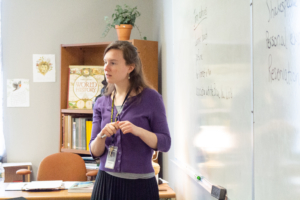 Logic has a central place in the curriculum. Students take two years of logic classes where principles of valid reasoning, informal fallacies and symbolic logic are taught. Students apply their skills learned in logic across the curriculum. For example, students in history, literature or science classes will be required to think logically about the content they study and to expose any fallacies they detect in texts, presentations and classmates (respectfully of course). Writing assignments in these classes are assessed for their logical sharpness, and examinations presuppose logical skill.
Logic has a central place in the curriculum. Students take two years of logic classes where principles of valid reasoning, informal fallacies and symbolic logic are taught. Students apply their skills learned in logic across the curriculum. For example, students in history, literature or science classes will be required to think logically about the content they study and to expose any fallacies they detect in texts, presentations and classmates (respectfully of course). Writing assignments in these classes are assessed for their logical sharpness, and examinations presuppose logical skill.
Rhetoric School
Most of us know that one can win an argument but still “lose the person.” Being logically correct does not necessarily mean that we will persuade others to take action or to adopt an idea. This is why it is necessary to train students not only in logic but also in rhetoric, for rhetoric is the art of persuasive speech and writing. Leaders must know how to persuade others to follow.
After having studied the disciplines of grammar and logic (or dialectic), students spend three years studying rhetoric. Like logic in the dialectic school, rhetoric is a central or “paradigmatic” discipline—students study other traditional subjects (e.g., history, science, math, literature, foreign language), but do so from a rhetorical perspective.
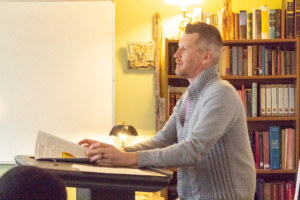 Rhetoric is the art of persuasive writing and speech. Through their study of rhetoric, students learn how to speak and write with eloquence, imagination, beauty and persuasion. They spend a good deal of time practicing what they learn by writing and delivering their own speeches and presentations for various classes. Lab reports, literature papers and exam essays all make use of rhetorical skill.
Rhetoric is the art of persuasive writing and speech. Through their study of rhetoric, students learn how to speak and write with eloquence, imagination, beauty and persuasion. They spend a good deal of time practicing what they learn by writing and delivering their own speeches and presentations for various classes. Lab reports, literature papers and exam essays all make use of rhetorical skill.
As they practice using rhetoric as a tool of learning, they are becoming good communicators, and they are also learning the material that makes up their speeches. The principles of constructing effective speeches are also applied to writing. Students write many papers of various lengths in their study of various subjects.
It is this emphasis on rhetoric that sets Covenant apart from other programs. It is at this final stage of their secondary education that our students synthesize all that they have learned in their previous schooling and concentrate on becoming masters of the spoken and written word.
While rhetoric is the paradigm discipline in the Rhetoric School, students study the traditional subjects of history, science, math, literature, foreign language, music and art. They also are able to choose elective courses in a variety of subjects including drama, Greek, philosophy, painting, military history. Click here to see an overview of our Covenant Course Plan.
Our graduates go on to attend a variety of colleges and universities where they report being well prepared for their studies. Click here to see recent college acceptances, and other important information in our Upper School Profile.
